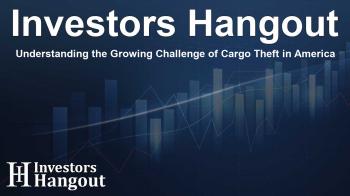Understanding the Growing Challenge of Cargo Theft in America

Understanding the Growing Challenge of Cargo Theft in America
Glawe Urges Passage of Combating Organized Retail Crime Act
David J. Glawe, the President and CEO of the National Insurance Crime Bureau (NICB), recently addressed the U.S. Senate Committee on the Judiciary regarding the alarming rise of cargo theft. His testimony was a clarion call for the passage of the Combating Organized Retail Crime Act (CORCA). The discussion highlighted the intricate challenges faced in tackling organized crime and the urgent need for efficient federal responses.
In his remarks, Glawe brought to light NICB's critical role at the intersection of insurance and law enforcement. With over three decades of experience in law enforcement and national security, Glawe was particularly concerned about the record levels of cargo theft becoming a tool for transnational crime. "Most cargo thefts are not just opportunistic; they stem from well-organized, sophisticated crime operations," he stated. Criminal networks are utilizing vulnerabilities in the supply chain and modern technology to fund various activities, including drug and weapons trafficking.
It's startling to note that incidents of cargo theft occur six to eight times daily, with an average loss of over $200,000 per theft. Recently, NICB has assisted in over 240 cargo crime investigations, resulting in more than 70 recoveries valued at around $40 million. Since 2022, this association has opened an average of 150 commercial cargo crime cases each year.
The NICB professionals work closely with local, state, and federal law enforcement, as well as member insurance companies, to address organized crime effectively. This collaboration has become paramount in recovering stolen goods and bringing perpetrators to justice.
Key Insights from David J. Glawe's Testimony
During the Senate Judiciary Committee hearing, Glawe emphasized several crucial points regarding the state of cargo theft:
- Historic Spike in Cargo Thefts: The value of stolen goods surpassed $1 billion in 2023, marking a 27% increase in 2024. Projections indicate a continued rise of 22% by the end of 2025.
- Transnational Crime Organizations: These groups thrive through cyber-enabled logistics manipulation, highlighting the significance of modern cybersecurity measures in preventing such crimes.
- Funding of Criminal Activities: Stolen merchandise, ranging from everyday items to luxury goods, often ends up in illicit markets, fuelling activities like drug trafficking and arms dealing.
- Collaboration with Law Enforcement: NICB's special agents and intelligence analysts maintain rigorous partnerships with law enforcement agencies to dismantle organized cargo theft operations.
- Support for Combating Organized Retail Crime Act (S. 1404): Glawe stressed the importance of this legislation to enhance federal coordination and improve enforcement in cargo theft investigations.
There is a growing recognition among businesses, law enforcement, and policymakers that concerted, collaborative action is essential to effectively combat cargo theft. During the hearing, other notable figures, including Donna Lemm from IMC Logistics and Summer Stephan, District Attorney of San Diego County, provided additional insights into the challenges and solutions surrounding organized theft.
Individuals are encouraged to report suspected cargo theft incidents to local law enforcement, contact their insurance providers, and reach out to the NICB hotline for immediate assistance.
About the National Insurance Crime Bureau
The National Insurance Crime Bureau is an organization committed to fighting insurance crime in the United States. Through its headquarters in Oak Brook, NICB collaborates with over 1,200 property and casualty insurance firms to enhance intelligence, analytics, and operational efforts in crime prevention. NICB’s initiatives also focus on education and advocacy to combat crime effectively, making a significant impact on insurance fraud and other related crimes.
Frequently Asked Questions
What is the main focus of David J. Glawe's testimony?
Glawe's testimony primarily addresses the alarming increase in cargo theft and the need for the Combating Organized Retail Crime Act to combat organized crime effectively.
How often do cargo theft incidents occur?
There are typically six to eight incidents of cargo theft each day, highlighting the scale of the problem.
What is the average loss associated with cargo theft?
The average value of stolen cargo is more than $200,000 per incident, which has significant economic implications.
How does NICB help in addressing cargo theft?
NICB coordinates with law enforcement agencies at various levels to investigate cases and recover stolen goods, fostering collaboration across the industry.
What is the expected trend for cargo theft in the coming years?
It's projected that the value of stolen goods will continue to rise, potentially increasing by 22% by the end of 2025.
About The Author
Contact Ryan Hughes privately here. Or send an email with ATTN: Ryan Hughes as the subject to contact@investorshangout.com.
About Investors Hangout
Investors Hangout is a leading online stock forum for financial discussion and learning, offering a wide range of free tools and resources. It draws in traders of all levels, who exchange market knowledge, investigate trading tactics, and keep an eye on industry developments in real time. Featuring financial articles, stock message boards, quotes, charts, company profiles, and live news updates. Through cooperative learning and a wealth of informational resources, it helps users from novices creating their first portfolios to experts honing their techniques. Join Investors Hangout today: https://investorshangout.com/
The content of this article is based on factual, publicly available information and does not represent legal, financial, or investment advice. Investors Hangout does not offer financial advice, and the author is not a licensed financial advisor. Consult a qualified advisor before making any financial or investment decisions based on this article. This article should not be considered advice to purchase, sell, or hold any securities or other investments. If any of the material provided here is inaccurate, please contact us for corrections.

